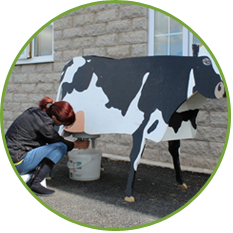 Public health experts have launched an investigation into the outbreak, which has been linked to Swithens Farm, in Rothwell, Leeds.
Public health experts have launched an investigation into the outbreak, which has been linked to Swithens Farm, in Rothwell, Leeds.
A total of 29 cases of cryptosporidiosis have so far been confirmed.
Two cases of E. coli O157 have also been reported. All those affected visited Swithens Farm from the beginning of March onwards.
Public Health England (PHE) has been drafted in to deal with the issue and the owners of the farm voluntarily closed the facility for a period after the outbreak became apparent.
The petting farm has since reopened and its owners say “every effort is being taken to ensure that visitors are not put at risk.”
Dr Mike Gent, consultant in communicable disease control with Public Health England, said, “People may be tempted to use hand gels and wipes during a farm visit and after touching animals but, although they remove visible dirt and contamination, they may not be effective in removing the germs found on farms.”
Ian and Angela Broadhead, who run Swithens Farm, have released a statement explaining that they are working with the council after becoming aware that “there have been some children with upset stomachs.”
A table of petting zoo outbreaks is available at https://barfblog.com/wp-content/uploads/2016/05/Petting-Zoo-Outbreaks-Table-5-5-16.xlsx

